Facebook: The Risks of Social Networks in the Digital Age
Main Article Content
Abstract
The objectives of this paper were to study 1) theories used to explain the risks associated with using social networks. 2) The studying on perceived risks from building relationships in online social networks, 3) online social networks and the risks of Thai adolescents in the digital age, and 4) online social networks and research ideas. The results of the study showed that 1) theories used to explain the risks of using social networks from the past studies, including concepts, exchange theory, Managing personal matters in communication 2) Social networks and their risks. It is the user's perception of the risk being compromised by their trust in the network operator. 3) Privacy awareness. arising from the recognition of the right to protect personal information and illegally using personal data, consisting of 3 parts: data storage, inappropriate data access characteristics, and the use of the information without permission 4) should develop a government management system by amending the outdated law Increase the efficiency of personnel and management of laws related to intellectual property protection. as well as formulate strategies for creating opportunities, equality, and social equality through technology. Promote and develop mass communication as a mechanism to support the development of the people's sector to be knowledgeable about online media.
Article Details

This work is licensed under a Creative Commons Attribution-NonCommercial-NoDerivatives 4.0 International License.
Views and opinions appearing in the Journal it is the responsibility of the author of the article, and does not constitute the view and responsibility of the editorial team.
References
Bazarova, N. N., & Choi, Y. H. (2014). Self-Disclosure in Social Media: Extending the Functional Approach to Disclosure Motivations and Characteristics on Social Network Sites. Journal of Communication, 64(4), 635-657. doi:10.1111/jcom.12106
Buckel, T., & Thiesse, F. (2014). Paving the Way to a Productive RFID System: A Novel Action Research-Based Study from Fashion Retail. In The 47th Hawaii International Conference on System Sciences, pp. 4680-4689, DOI: 10.1109/HICSS.2014.573.
Chantavanich, S. (2008). Theory of Sociology. Bangkok: Chulalongkorn University.
Chen, X., Pan, Y., & Cai, S. (2013). User Self-Disclosure on SNSs: A Privacy Risk and Social Capital Perspective. In Proceedings of the International Conference on Electronic Business, Singapore, Pp.16-27.
Ketwongsa, P., & Chuanwan, S. (2014). Who’s Who on Social Networks. Institute for Population and Social Research, Mahidol University.
Khonthaifoundation. (2014). Report “Thai People” Monitor 2014: Voice of Thai Youth (Youth Today). Retrieved from http://khonthaifoundation.org/wp-content/files/5___Full_version_2557.pdf
Krasnova, H., Spiekermann, S., Koroleva, K., & Hildebrand, T. (2010). Online Social Networks: Why We Disclose. Journal of Information Technology, 25(2), 109-125. DOI:10.1057/jit.2010.6
Moore, K., & Mcelroy, J. C. (2012). The Influence of Personality on Facebook Usage, Wall Postings, and Regret. Computers in Human Behavior, 28(1), 267-274. DOI: 10.1016/j.chb.2011.09.009
Moorhead, A. S., Hazlett, D. E., Harrison, L., Carroll, J.K., Irwin, A., & Hoving, C. (2013). A New Dimension of Health Care: Systematic Review of the Uses, Benefits, and Limitations of Social Media for Health Communication. Journal of Medical Internet Research, 15(4), e85. DOI: 10.2196/jmir.1933
Prachachat Business. (2021). Unveils The 13th National Economic and Social Development Plan, Focusing on 5 key goals to Transform Thailand. Retrieved from https://www.prachachat.net/finance/news-766530
Prajaknate, P. (2017). Communication and Innovation: Expanding the Explanatory Power of Communication Theories and Concepts from “Real World Setting” to “Virtual Setting”. Journal of Communication and Innovation NIDA, 1(1), 33-48.
Santitham, W. (2016). Effects of Facebook use on Academic Performance of Students in Bangkok. Research and Development News Paper, 15(161), 16-23.
Somthawinpongsai, C. (2018). Factors Affecting Self-disclosure of Online Social Networking. Pathumthani University Academic Journal, 10(2), 267-275.
Somthawinpongsai, C., Khan, A. J., Sairien, S., Busabok, A., & Wankong, T. (2020). Structure Equation Model of Perceived Benefits for using Facebook of Thai Teenager. Biomedical Journal of Scientific & Technical Research, Biomedical Research Network+, LLC, 28(1),
-21248. DOI: 10.26717/BJSTR.2020.28.004592
Ryan, T., & Xenos, S. (2011). Who uses Facebook? An Investigation into the Relationship Between the Big Five, Shyness, Narcissism, Loneliness, and Facebook usage. Computers in Human Behavior, 27(5), 1658-1664.
Wang, S.S., & Stefanone, M.A. (2013). Showing Off? Human Mobility and the Interplay of Trust Self-Disclosure and Facebook Check-Ins. Social Science Computer Review, 31(4), 437-457. DOI:10.1177/0894439313481424
Xu, H., Dinev, T., Smith, H.J., & Hart, P. (2008). Examining the Formation of Individual’s Privacy Concerns: Toward an Integrative View. In Proceedings of the Twenty-Ninth International Conference on Information Systems, Paris, France, Pp.1-16. http://aisel.aisnet.org/icis2008/6


